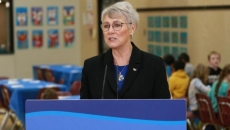The Liberal government will consider tougher criminal penalties for people who steal vehicles, Prime Minister Justin Trudeau said Thursday as he kicked off a daylong summit aimed at confronting the scourge of auto theft.
"The rise over the last years has been alarming," Trudeau told the gathering of cabinet ministers, law enforcement officials, border authorities and insurance and automaker emissaries.
He described how Canadian vehicles are turning up in places like Ghana and Nigeria, with one particular family having their SUV stolen on three separate occasions.
"Organized crime is becoming more brazen, and the overseas market for the stolen cars is expanding."
The political sheen on the event was also unmistakable. Trudeau blamed the previous Conservative government for slashing spending on border security, making it harder to prevent stolen vehicles from leaving the country.
And he took a pointed jab at Conservative rival Pierre Poilievre, who has been flooding the airwaves and social media with aggressive counter-programming aimed at neutralizing the effect of the gathering Thursday.
"A catchy slogan won't stop auto theft; a two-minute YouTube video won't stop organized crime," Trudeau said.
"Cracking down on auto theft means bringing law enforcement, border services, port authorities, carmakers and insurance companies together."
The rise in auto thefts is alarming. Criminals are becoming more brazen, and the international black market for stolen cars has grown.
— Justin Trudeau (@JustinTrudeau) February 8, 2024
To stop these criminals, and to prevent these thefts from happening in the first place, we’re taking action. Here’s how: pic.twitter.com/Q6jbCn4Ot0
Industry Minister François-Philippe Champagne later told the group the government would also move to ban imports of high-tech devices that have become the preferred tools of the illicit trade.
The federal government says an estimated 90,000 cars are stolen annually in Canada, resulting in about $1 billion in costs to Canadian insurance policyholders and taxpayers.
It says auto theft increasingly involves organized crime groups, and the proceeds of these crimes are used to fund other illegal activities.
Most stolen autos shipped abroad are destined for Africa and the Middle East, Ottawa says.
On Wednesday, the government earmarked $28 million in new money to help tackle the export of stolen vehicles.
Federal officials say Canada has strong laws in place to address auto theft at various stages of the crime, including possession and trafficking of stolen property, and tampering with Vehicle Identification Numbers.
The Criminal Code also includes comprehensive measures to target organized crime, including specific offences and enhanced sentencing for violent acts such as assault with a weapon, the government says.
Even so, Justice Minister Arif Virani acknowledged Thursday a need to review criminal laws to find improvements that would be targeted, efficient and intelligent — and not cause more problems than they solve — with a focus on links to organized crime and those running auto theft operations.
Ontario Solicitor General Michael Kerzner welcomed the prospect of toughening criminal penalties against car thieves.
"We want to stop the revolving door of people coming back out on our streets and doing it again," he told the meeting. "We want to have them locked up, we want to have them in jail."






